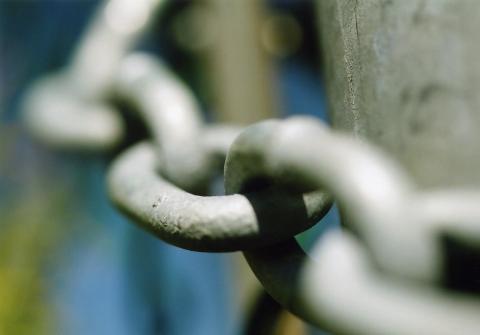This week the IMF Executive Board will consider a proposal to provide Ukraine with a US$17.5 billion Extended Fund Facility. The IMF Managing Director explains that this program 'can succeed'. But it has to be said that the chances are low, given current geopolitical circumstances and Kiev's recent economic performance.
 IMF Managing Director Christine Lagarde delivering a statement on a financial stand-by arrangement for Ukraine, 30 April 2014.
IMF Managing Director Christine Lagarde delivering a statement on a financial stand-by arrangement for Ukraine, 30 April 2014.
Why, then, is the Facility almost certain to be approved by the Executive Board?
The short answer is that no one has offered a viable alternative. Is the geopolitical clash for Europe's borders going to be lost because Kiev can't fund its budget? Will the battle be lost for want of a nail? The economic problems of Ukraine have been shoved over to the IMF to sort out as best it can.
In April last year, the IMF provided Ukraine with a US$17 billion Stand-by Arrangement, around US$4 billion of which has already been disbursed. The current IMF proposal is that this should morph into an Extended Loan Facility (ie. a four-year loan rather than short-term support), which would form part of a bigger assistance program including contributions from other multilateral agencies, bilateral government lenders and debt relief from creditors. All this is envisaged to add up to a package of around US$40 billion – not yet agreed, but confidently expected.
The geopolitical environment gets a mention in the Lagarde statement ('And yet, while this is a comprehensive and strong program, it is also subject to high risks. The main risk, of course, relates to geopolitical developments that may affect market and investor confidence') but only to say that everyone hopes it will all work out for the best. Yet anyone watching the evening news might conclude that the war is not going well and has no prospect of early settlement. [fold]
Meanwhile, back on Ukraine's home front, the economic outlook is parlous. GDP fell nearly 10% last year. Budget austerity has brought the 2014 deficit down to 4% of GDP on IMF calculations, but if the cost of bailing out the domestic banks and state enterprises is counted, the figure would be 13.5% last year and nearly 9% this year. Getting the budget into surplus won't be popular. The price of gas and heating oil has been raised but is still only around half the world-market price, with more consumer pain ahead with plans to bring it up to market parity by 2016.
Public servants are being asked to trim their pensions (currently absorbing 16% of GDP) and work longer. The current account deficit is 5% of GDP and foreign exchange reserves are minimal. Inflation is running at nearly 30%. The newly flexible exchange rate, which fell 45% after the fixed rate was abandoned last year, has lost a further half of its value this year and has fluctuated wildly. Bank depositors are shifting into foreign currency when they can do so. Foreign creditors are asking for repayment, with the largest, Russia, unlikely to cooperate with debt relief. Kiev was forced by the EU to make a US$3.1 billion disputed arrears payment to Gazprom late last year so that Gazprom would not cut gas deliveries to the EU.
But what else can the Fund do other than 'whistle in the dark', hoping that things might get better while continuing to provide money to keep Kiev operational? Who else would offer to step in if the Fund wasn't ready to do the job?
All this is the political reality of international agencies' governance. The Fund is wheeled out by the major members to stop-gap whatever economic shortfall occurs, especially if the problem country is 'strategic'. The amount involved here is smaller than that for Greece in 2010 (where the Fund was dudded for US$30 billion), but is a much larger proportion of the overall support package. With no agreed procedures for sovereign debt rescheduling (thanks to Wall St's self-interested reluctance to change the messy status quo), the Fund's money will defer indefinitely the reality that creditors should be bearing the main burden of the external shortfall.
In all of this, the Fund has to preserve some semblance of its principles: that it only lends where it has good prospects of being repaid, and that it doesn't lend new money to bail out old creditors. It does this by rose-tinted optimism about how things will work out. In the process, its reputation for professional economic advice gets chipped away. And in order to preserve some modicum of its traditional function, the Fund imposes a standard reform agenda on Kiev that may well be inappropriate for a country with its back to the wall.
Photo courtesy of Flickr user International Monetary Fund.
